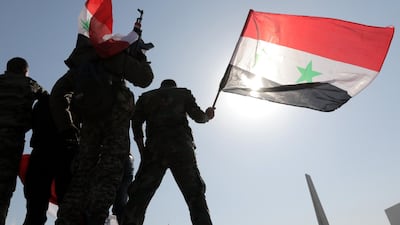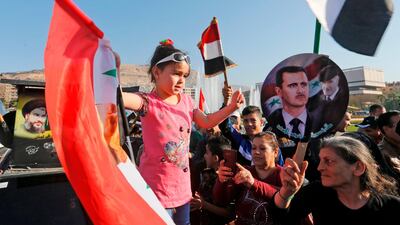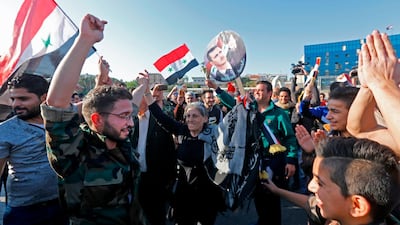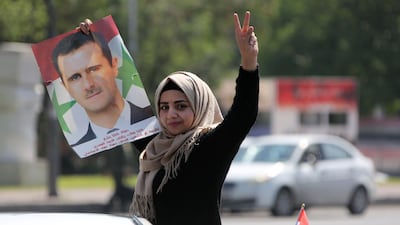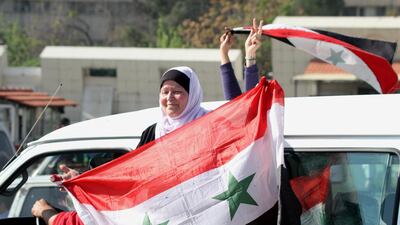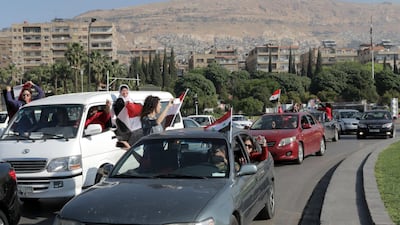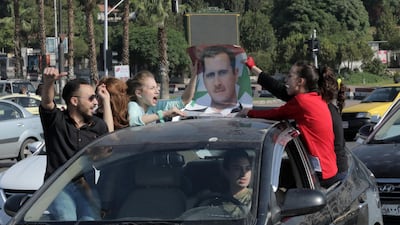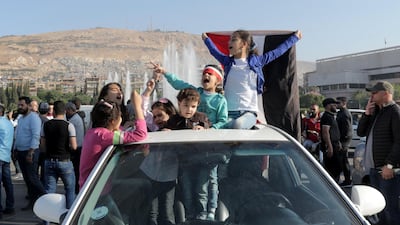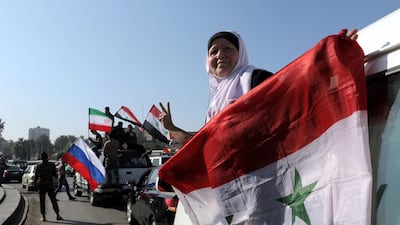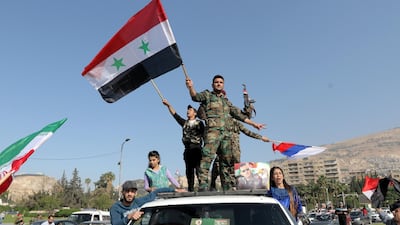In the cobbled streets of old Damascus, there is little sign of the seven years of civil war that has ravaged the rest of Syria.
On Sunday, barely 24 hours after the United States and its allies fired 105 missiles at Syrian government targets near the capital and in Homs to the north, the mood is one of relief and defiance. The Assad regime's propaganda machine is in overdrive, claiming victory, after the attack threatened by US president Donald Trump turned out to be less severe than anticipated.
As Mr Trump tweeted threats of retaliation following a chemical weapons attack in Eastern Ghouta on April 7, there were a number of reports of Syrian military hardware being moved to Russian-occupied bases across the country. There were even suggestions that some had been shifted into urban civilian areas to shield it from an anticipated barrage.
"We had a double victory, first the clearing of Ghouta and then the air strikes," the Syrian Minister for Religious Affairs, Mohammad Abdul-Sattar Al Sayyed, told The National.
Many of the missiles fired by the US, British and French forces early on Saturday destroyed an alleged chemical-weapons research centre north of Damascus. The western allies said they also hit storage and production facilities in Homs, setting back Syria's chemical weapons programme by years. But many in Damascus feel that President Bashar Al Assad's government has been emboldened, having shrugged off the attack of a superpower.
The line that the US violated international law, yet Syria proved its strength by seeing off another American onslaught, was rapidly seized on by Assad's supporters at all levels.
"All the Syrians are proud of their army and confident in their president. They know they can resist this sort of attack," Fadia Deeb, MP for Homs, told The National.
At Sunday mass in St George's Cathedral in Bab Touma, barely two kilometres from the now recaptured East Ghouta region, Patriarch Aphrem of the Syrian Orthodox Church tells his congregation: "Let us pray for the Syrians, and let us pray for those who violate international law."
_______________
Read more:
Ambassador Haley: US will stay in Syria until it secures goals
Air strikes fail to destroy ‘heart’ of Syrian weapons programme: defector
_______________
Opening his barber shop in a Christian neighbourhood of the old city, Josef Rawan, 45, says he believes the strikes have proved the resilience of Mr Al Assad's government. As he speaks, two Mukhabarat officers stand in the street within earshot, their radios in hand occasionally crackling.
At a meeting of about 20 Syrian MPs headed by parliament speaker Hammouda Sabbagh, there is absolute unanimity.
"There was no chemical attack in Douma 10 days ago, all these allegations are nothing to do with the truth", Mr Sabbagh says. "This is proof there is co-ordination between the West and terror groups. We got back this attack, now we are safe, and stronger."
The 20 MPs nod in agreement – some even applaud.
Everyone that The National speaks to appears to know exactly what happened in Douma and to agree that Mr Al Assad has emerged stronger from the western retaliation.
"He has seen off the jihadists and Americans for eight years, he will see them off for another 80," Mr Rawan proclaims.
Their views conform exactly to the government line that rebels staged the chemical attack in Douma as a false flag operation to lure in international action. There are no competing theories in Damascus – this is fact. The line is pervasive, it is disseminated in the churches and mosques, on state television, by the simple shopkeeper and the government minister. In Damascus, it appears the truth has been written, even before international chemical-weapons inspectors have visited Douma.
Ms Deeb says there is precedent: "They did it in East Ghouta in 2013."
But there is confusion, too, with simultaneous claims that the attack was staged for cameras, while also maintaining it did actually happen, but was carried out by the opposition.
Ms Deeb suggests: "They were faking the symptoms in the video, and the Syrian army found the jihadists' chemical-weapons factories when they entered Ghouta."
As he slams the shutter of his shop, painted with the red-and-black flag of Syria, Mr Rawan glances at a poster of Mr Al Assad looking over the street and asks: "Why were there only children poisoned? Are adults immune?"
Clips of the aftermath of the attack shown on Syrian TV are heavily edited, but raw footage posted online, and figures released by opposition groups, suggest most of the casualties were adults.
Elias Munther, a street sweeper, admits to initial alarm about the West's missiles.
"We were a little worried, but in the end we watched the strikes from my roof. It was like a firework show," he says.
"They will strike again I'm sure, but it won't change a thing. Bashar doesn't fear them."
_______________
Read more:
Limited strikes, limited goals and no strategy on Syria
_______________
